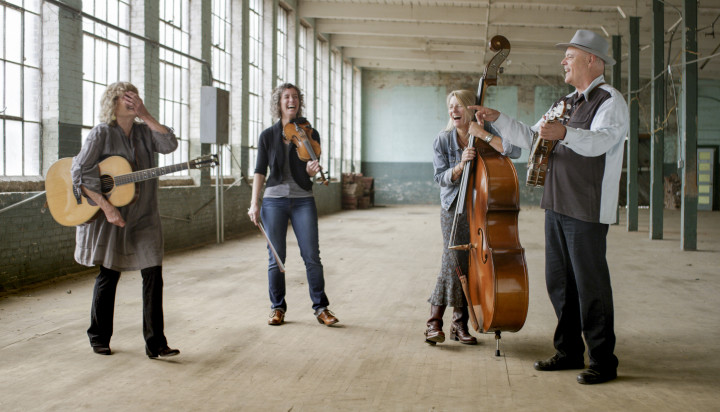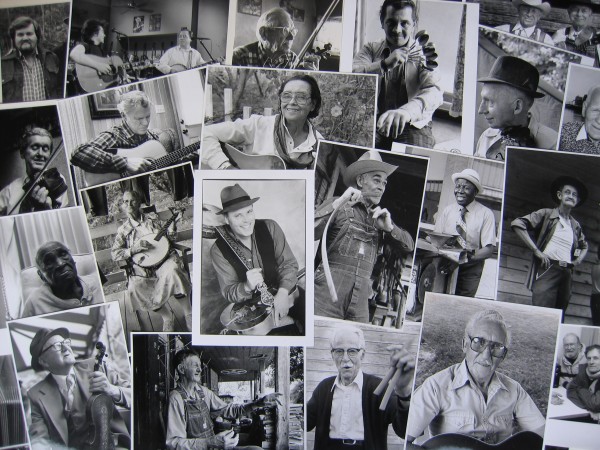Four-time Grammy winner David Holt will debut the second season of his TV series, David Holt’s State of Music, Saturday, April 8 at 9 p.m. on the North Carolina Channel. The shows focus on local talents in bluegrass, folk, country and gospel. Each episode is filmed at a historic location, such as the Glencoe Mill on the Haw River near Burlington, the courthouse in Hendersonville and the former Platt family farm in Brevard.
In addition to the season premiere, Holt’s photographs are on exhibit through May 6, at the Western Office of the N.C. Department of Natural and Cultural Resources, 176 Riceville Road, in east Asheville. Titled Mentors and Heroes, the black-and-white portrait photos include Madison County ballad singers Dellie Norton, Cas Wallin, Berzilla Wallin, Sheila Kay and others.
Holt took time to speak with Xpress about his latest projects and how they strive to preserve the history and culture of Western North Carolina.
Mountain Xpress: Can we start with a brief breakdown of your show? What will each 30-minute episode look like?
David Holt: I’ll be interviewing musicians, learning about what they’re up to, and then the musical performances will be shot on location. There’s some really nice scenery.
Were the locations selected with the performers in mind?
As much as they could be. The farm, where Steep Canyon Rangers play, used to be owned by Woody Platt, who is one of the lead guys of the Steep Canyon Rangers. It had a lot of family connections to them. … And then Alice Gerrard and Laurelyn Dossett are performing mill songs inside a former textile mill. These used to be such an important part of North Carolina’s history and North Carolina’s economy, and now they’re almost all shut down. But it’s a beautiful location in an eerie way.

Do you view music as a vessel for exploring history, by helping us trace — and in many instances listen to — those who came before us?
I think so. Take the band Mipso for example, or Amythyst Kiah from Johnston City [both featured in season two]. These are young people, but they’re bringing parts of that old music forward. … It’s never been static — from the 1840s minstrel shows and vaudeville and the blues and banjo bands — all these things are integrated into the [new] music, so it always changes. And yet it’s always been moving forward from a historical perspective.
You’ve also got a collection of your photographs up at the Western Office called Mentors and Heroes. In a way, it tracks your own history in Western North Carolina. When did you first arrive here and was it the music that brought you to the area?
I came here in ’69, from Santa Barbara, California. There were several things that brought me here, but let me give you the short story. I heard a recording of Obray Ramsey, who was from Madison County, North Carolina. He was singing a song called “The French Broad River Song,” that he had written. Everything else he did was traditional and quite good, but he wrote this song and I thought, “Man I want to see that French Broad River place. That sounds really historic. That sounds really exotic. And something I’d really like to see.” So I left that summer in ’69 to find it out and go see it. And I fell in love with it when I saw the area and the river.
As the exhibit’s title suggests, these are photographs of your musical mentors and heroes. When you were taking these pictures, did you have in mind that these would be historical documents, or was it more a visual and artistic expression for you?
I was in my early 20s and I realized these people were the last of a generation. They were the last of our kind of people that were closer to their pioneer ancestors than they were to the modern world. They were born in the late 1800s, a lot of them. They had this old wisdom with them. I like to say they came of age before self-doubt was invented. They were just really solid, solid people. They knew a lot of skills. They could certainly take care of themselves in about any situation. That just fascinated me. I was already a photographer and I really tried to get pictures. … It was at a time when I didn’t have much money, so I would only take one or two shots of the black-and-white negative photographs. The film had to be developed. You had to print the pictures. It was expensive. So it really gave me an eye for trying to capture that important moment where you could see in somebody’s face that there was a lot of depth — a lot going on that you couldn’t just put into a simple sentence. These pictures are [of] people with a lot of soul.
You’re a musician, a photographer, a historian and a television host. What drives you and how do all these platforms fit together?
Well, I was trained as a visual artist and biologist in college, so I guess I’ve always loved art. Taking pictures of my mentors was a natural thing to have happen. And I realized these were not famous people, or most of them were not famous. A few were: Doc Watson and Roy Acuff. But most of them weren’t, and there weren’t really going to be nice photographs of them unless I took them. … It all fits together around the music. The mentors were the people I learned the music from, and the music has its own power that I try to play. I learned from those people, but I try to play in a modern way. That is to say, I might bend the old tradition a little bit, but I never try to break it. I just try to move it. I try to play it through my sensibilities — because it is a living music. I don’t think it’s a museum piece. My job is to deliver it through me to a modern audience and hopefully attract a few people to carry it on.
“David Holt’s State of Music,” runs every Saturday in April, 9-10 p.m. on the North Carolina Channel. For more information visit davidholttv.org. For more on Mentors and Heroes, visit avl.mx/3kb.






Before you comment
The comments section is here to provide a platform for civil dialogue on the issues we face together as a local community. Xpress is committed to offering this platform for all voices, but when the tone of the discussion gets nasty or strays off topic, we believe many people choose not to participate. Xpress editors are determined to moderate comments to ensure a constructive interchange is maintained. All comments judged not to be in keeping with the spirit of civil discourse will be removed and repeat violators will be banned. See here for our terms of service. Thank you for being part of this effort to promote respectful discussion.